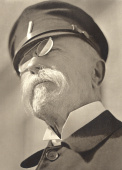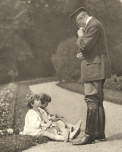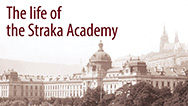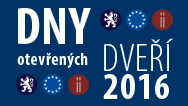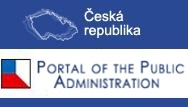Important personalities
15. 3. 2010
Tomas Garrigue Masaryk (7 March 1850 - 14 September 1937)
The family often moved due to the father's job. The village Čejkovice, where he attended the elementary school, Masaryk regarded "as his child's home". The country where he was growing imprinted to his soul; he used to say later that he had liked plains since then: "I feel oppression in valleys as I cannot see a lot of sunshine there ..." In Hustopeče he attended a German grammar school, for certain time he was getting training in smithery in Vienna and Čejč. Then he returned back to the grammar school as a junior teacher, he attended grammar school in Brno and made a living by giving private lessons. After his expulsion from the school (He told to Karel Čapek that it had been due to discontent of his teachers with the fact that he had fallen love with a sister-in-law of his landlady), he finished his studies in Vienna (he reminisced that he had wanted to become a diplomat and for this reason he had even attended Arabic lessons) and after school-leaving examination in 1872 – when he was twenty-two years old – he started to study philosophy, philology and natural sciences at the Faculty of Arts of the Vienna University.
During his Vienna studies he became a preceptor in the family of the banker Schlesinger; at that time he was not suffering want. During his one-year stay at the Leipzig University he met Charlotta Garrigue, a daughter of a businessman from New York City, who was doing her piano studies there. They got married in New York City in 1878 and according to the American custom he adopted her name. Charlotte gave birth to six children, four of them lived to their adulthood; the most well-known of them was the son Jan, future Minister of Foreign Affairs in Prime Minister Beneš's cabinets.
In 1879 Masaryk took a higher doctorate by defending his thesis written in German "Suicide as a Mass Social Phenomenon of Modern Civilization". Thus for the first time appeared the theme which he never abandoned: the theme of crisis of a modern man – crisis which appeared after the break–up of the medieval harmonic world view – and ways how to overcome such crisis. After graduation he lectured at the Vienna University as a private associated professor. Masaryk was from the very beginning interested in ethical, social and political dimension of philosophy. His thought was partly influenced by positivism: "philosophy should be based on science" and Masaryk put emphasis on the concrete and facts. But throughout his life Masaryk also the most appreciated the philosopher Plato: "How that interest of mine in facts can be reconciled with that Platonism of mine? (...) I want to know facts, but I also want to see their sense, what they are pointing at. And thus we are in the sphere of metaphysics."
From 1882 he lectured at the Prague University; together with several friends of his he founded a group of so-called realists, the principal ideas of which were for the first time presented in an article in 1883. "We did not have any real political programme" he reminisced later, "we were rather sticking together as a generation. We wanted to improve conditions, to improve newspapers and the university, we were in favour of positive and active policy – it was not a clear programme, it was rather a direction, a direction critical and scientific ...". And Masaryk also admitted that through coolness of realism he was able to overcome romantic part of his individuality. He said about his political attitudes: "I have always in favour of reasonable and fair policy". In 1900, together with František Drtina, Edvard Beneš and others, he established a new political party – the Czech Popular Party (Realistic).
For some time he was a member of the Austrian Parliament but after two years he resigned from his mandate. (Later he became still two more times a member of the Austrian Parliament). In 1890' we often visited workers and lectured for them. He stimulated foundation of the Workers Academy. "I adopted socialism until he was identical with the humane programme; I did not accept Marxism," and he also added: "My socialism is simply said love for neighbour, humaneness. I wish there were no poverty and all people could live comfortably and everyone had elbow-room, as Americans say. (...) I am always in favour of working people, very often in favour of socialism and rarely in favour of Marxism."
Masaryk was always a crusader, he was not afraid of going against majority. First of his great political and social fight was in 1877 when he challenged the validity of epic poems Rukopis Královédvorský and Rukopis Zelenohorský. Then he was for the first time branded as traitor of the nation. "This issue has been primarily a moral issue for me – in case they are spurious we must inform the world of it. Our pride, our education must not be based on lie. And then – we will not be able to get correct knowledge on our history until we stumble over fabricated past." The second great Masaryk's fight was his involvement in the Hilsner trial in 1899. It was a fight for renewal of the trial against Leopold Hilsner, a young Jewish man accused of ritual murder. And Masaryk, twenty years later celebrated as a "Farther of the Nation", was branded again as a renegade and traitor, his students at the university boycotted him ...
In 1990' he published the Czech Issue in which he explained his concept of the sense of Czech history: he was of the opinion that it was the development of the idea of humanity which he saw in the time line from Jan Hus and the Hussites times, the Czech Reformation, up to the National Revival, to Havlíček and Palacký. The Masaryk's concept was often criticized as simplifying and stimulated a long-lasting dispute which has not quite finished so far. On the Masaryk's side was for example Emanuel Rádl while Josef P ekař was on the side of his objectors.
In 1907-1914 he became again a member of the Austrian Parliament; he was gradually losing his belief in reformability of the Austro-Hungarian Empire; after the outbreak of the World War One he left for Switzerland and on the occasions of the five-hundredth anniversary of the burning of Jan Hus at the stake he gave a speech in which he declared the fight against the Austria-Hungary. He established a revolt organization, so-called Mafia. In 1917 he was living for some time in Russia where organized activities of the Czech legion; then he left for the United States where he was launching among compatriots a campaign for a free state. Later, in his book World Revolution he explained his concept of the World War One as the world revolution against theocracy, i.e. against autocratic systems based on the state religion.
In 1918 Masaryk was in Pittsburgh where representatives of Czech and Slovak organizations signed an agreement on the establishment of the new common state. On 26 September the first provisional Czechoslovak government was established chaired by Masaryk and on 18 October the government proclaimed so-called Washington Declaration in which the independent Czechoslovak Republic was declared. In December 1918 Masaryk returned home and took his official oath; he was elected a president in total four times. Also in his position of the President, Masaryk remained a strong personality and fully used all his competences. He was connected in particular with so-called Group of the Castle, a political group of people who were close to him. The Castle could rely especially on the Czechoslovak National Social Party, the Czechoslovak Social Democratic Party, the Czechoslovak Association of Legionnaires; also certain other personalities of the political, economic and cultural sphere belonged to this community. Perhaps the greatest Masaryk's merit is the fact that even in the most turbulent conditions of that period, when authoritative regimes were on the rise, Czechoslovakia never deviated from the democratic regime. On 14 December 1935 Masaryk resigned from his post due to health reasons; he died on 14 September 1937.
Masaryk used to say that care for educatedness and moral aspects of the society, care for spiritual climate of a society, ability to rise above partial interests are inseparably linked to democracy. When Karel Čapek asked him to formulate the most important reason of his for democracy, Masaryk answered: "The deepest argument for democracy – belief in human being, in his or her value, spirituality and immortal soul; that is the genuine metaphysical equality. Democracy is ethically justified as a political realization of love for a neighbour." Then he specified his attitude: "Democracy is not only a state form, it is not something what is written in constitutions; democracy is a view of life, it consists in belief in human beings, in humanity, and there is no trust without love, there is no love without trust. I have already said before that democracy is a discussion. But the real discussion is possible only if people trust each other and if they are trying fairly to find the truth."
